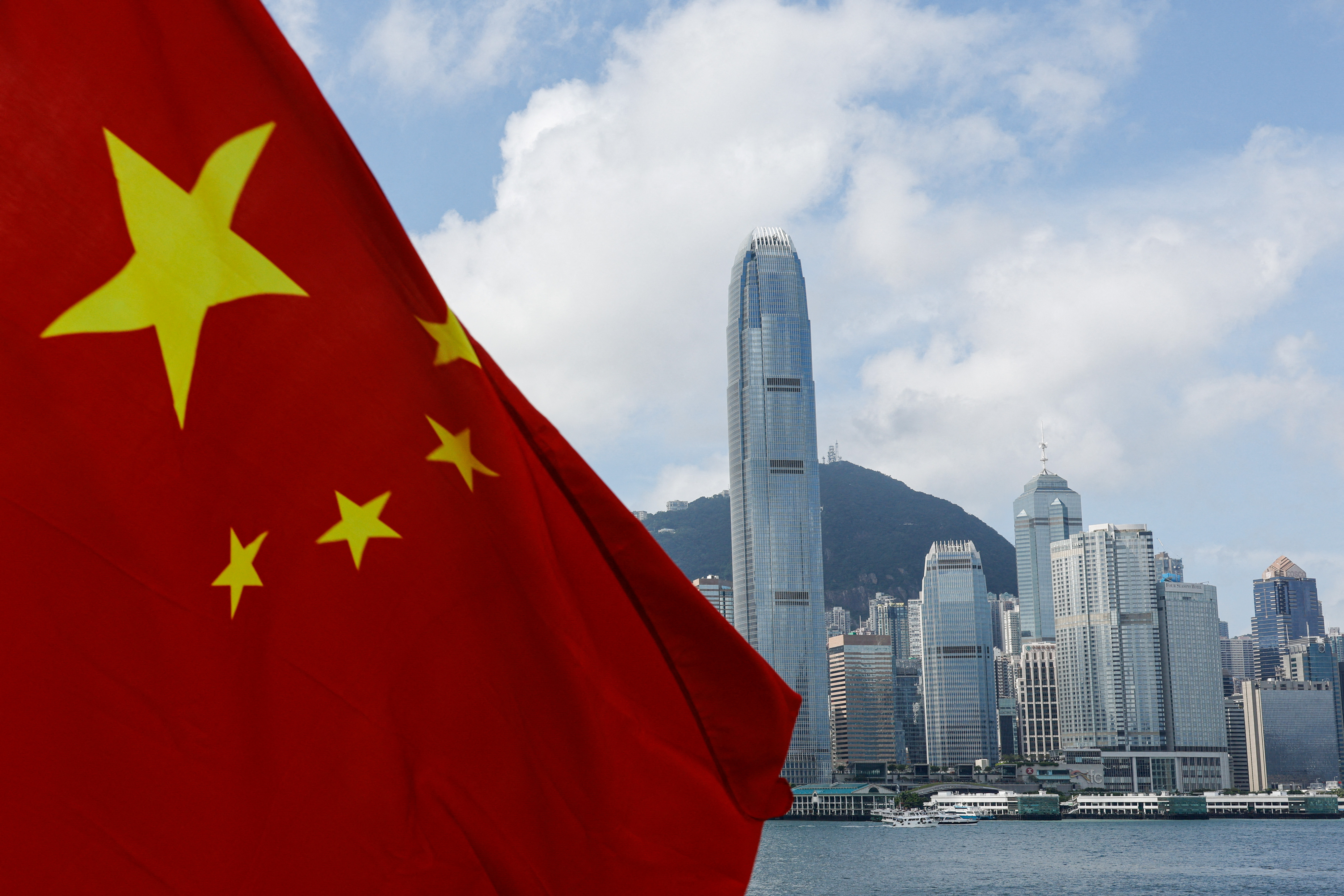
The Chinese national flag appears in front of the Central Financial District on Chinese National Day in Hong Kong, China on October 1, 2022. REUTERS/Tyrone Siu Obtaining licensing rights
BEIJING (Reuters) – The Chinese government has restricted the ability of local governments in 12 heavily indebted regions to take on new debt and placed limits on what new state-financed projects they can launch, three sources familiar with the matter said.
The sources said that the 12 regions, which cover a wide area of the country, will only be allowed to implement specific projects, such as those approved by the central government. Other projects, such as new railway stations and power plants, will not be allowed.
The sources were citing a Cabinet document dated late September that was delivered to local governments and government lenders this month.
The order also specifies that the debt growth of local government financing vehicles (LGFVs) should not be higher than the average loan growth rates for the corporate sector in the province where the LGFVs are located, two of the sources said.
This step by the Chinese government, or the State Council, to contain local government debt has not been previously reported.
The State Council did not respond to a Reuters request for comment.
These measures reflect efforts by the Chinese government to balance the need to defuse local government debt risks with pumping money into major infrastructure projects to stimulate the country’s faltering economy.
In practical terms, this means increasing debt at the national level while trying to reduce debt at the local level. On Tuesday, China agreed to issue additional sovereign bonds worth 1 trillion yuan ($137 billion) to support the economy.
Under the new order issued by the State Council, local governments will only be allowed to borrow to finance major projects approved by the State Council as well as a few types of projects in key areas. Two of the sources said that these projects include redeveloping urban neighborhoods and building affordable housing.
High risk areas
The 12 regions were previously identified as areas with a “high risk” of default on debt obligations. It had 7 provinces, including Liaoning and Jilin on the border with North Korea as well as Guizhou and Yunnan in the southwest, three autonomous regions and the cities of Tianjin and Chongqing.
The document said, according to two sources, that priority will be given to the regions in repaying debts due this year and 2024, and that debt extensions and new bank loans will also be allowed to replace existing loans.
The three sources refused to reveal their identity because the policies are confidential.
Debt-burdened municipalities represent a major risk to the world’s second-largest economy and its financial stability, amid a deepening real estate crisis, years of overinvestment in infrastructure and huge bills to contain the Covid-19 pandemic.
The collapse in property prices and the cash crunch have left developers unable to buy more land, traditionally a major source of local government revenue. Land sales from January to September were down nearly 20 percent from the same period last year.
Local governments’ debt burdens are much higher than at the central government level.
While central government debt represents only 21% of GDP, domestic debt will reach 92 trillion yuan ($12.58 trillion), or 76% of the country’s economic output in 2022, up from 62.2% in 2019. The huge piles of debt highlight the financial condition of local governments. Tension, fueling fears of a systemic financial crisis.
Part of that is debt issued by local government finance funds, which cities use to raise money for infrastructure projects, often at the request of the central government when it needs to boost economic growth.
China’s Politburo, the ruling Communist Party’s top decision-making body, said in late July that it would announce a set of measures to reduce local governments’ debt risks, but detailed plans have not yet been officially revealed.
Reuters reported last week that China had asked state-owned banks to extend existing local government debt with long-term loans at lower interest rates.
In addition, a large number of local governments – most of them heavily indebted ones such as Yunnan and Guizhou – began selling so-called refinancing bonds this month in a special one-time program to replace other forms of borrowing. The bond issue is widely believed to be part of Beijing’s measures to defuse debt risks related to domestic loan debt.
Report from Beijing newsroom; Edited by Don Durfee and Raju Gopalakrishnan
Our standards: Thomson Reuters Trust Principles.

“Typical beer advocate. Future teen idol. Unapologetic tv practitioner. Music trailblazer.”






/cloudfront-us-east-2.images.arcpublishing.com/reuters/IXCC6TKQJFI47DEEWJEBFT5WTA.jpg)
More Stories
JPMorgan expects the Fed to cut its benchmark interest rate by 100 basis points this year
NVDA Shares Drop After Earnings Beat Estimates
Shares of AI chip giant Nvidia fall despite record $30 billion in sales